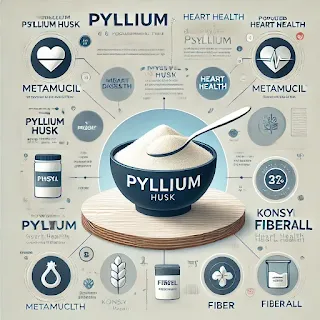Maintaining healthy cholesterol levels is essential for a strong heart and overall well-being. While medications can help, adopting natural remedies alongside a balanced lifestyle can deliver impressive results. This simple, natural recipe is designed to help you lower cholesterol effectively and improve your health without any expensive supplements or treatments.
The Recipe: Your Cholesterol-Lowering Power Drink
This drink combines powerful, natural ingredients known for their cholesterol-lowering and health-boosting properties. Here's what you need:
-
1 teaspoon psyllium husk
(easily available in most grocery stores or online)- Why it works: Rich in soluble fiber, psyllium husk binds to cholesterol in the gut, helping to eliminate it from the body. It also supports digestive health.
-
1 teaspoon ground flaxseed
(found in the health food or nutrition section of most stores)- Why it works: Packed with omega-3 fatty acids and fiber, flaxseed is a proven aid in reducing bad cholesterol (LDL) while boosting heart health.
-
¼ teaspoon Triphala powder (or 2–3 Triphala tablets)
(an Ayurvedic remedy, available at health stores or online)- Why it works: Known for its detoxifying properties, Triphala supports digestion and enhances the body's natural cholesterol management.
How to Prepare the Drink
- Add all the ingredients to a glass of warm water.
- Stir thoroughly and drink immediately to prevent the psyllium husk from thickening too much.
- Optional: Add a splash of lemon juice for taste and an extra boost of antioxidants.
When and How to Consume
- Drink this mixture before dinner.
- If you feel full after drinking, opt for a light dinner or cut back on portions to avoid overeating.
How Long to Follow the Regimen
- Stick to this regimen daily for at least three months.
- Regularly monitor your cholesterol levels during this period to track progress.
Why This Works
This recipe is designed to target cholesterol reduction naturally:
- Fiber Power: Both psyllium husk and flaxseed are rich in soluble fiber, which binds to cholesterol in the digestive tract and removes it from the body.
- Heart-Healthy Nutrients: Flaxseed provides omega-3s that help improve heart health.
- Detox and Digestive Support: Triphala helps detoxify and improves digestion, making the body more efficient in managing cholesterol.
By combining these ingredients with a light dinner, your body is better equipped to metabolize fat and cholesterol during the night when digestion slows.
Complementary Lifestyle Tips
While this drink can significantly impact your cholesterol, combining it with healthy lifestyle choices will maximize your results:
- Exercise Regularly: Engage in at least 30 minutes of physical activity daily, such as brisk walking, cycling, or yoga.
- Eat Smart: Focus on whole, unprocessed foods. Incorporate more fruits, vegetables, nuts, and seeds into your diet while reducing saturated fats and trans fats.
- Stay Hydrated: Drink plenty of water throughout the day to aid digestion and flush out toxins.
- Limit Sugary Foods and Refined Carbs: Opt for whole grains instead of processed grains and sugars.
- Get Enough Sleep: Ensure you get 7–8 hours of quality sleep each night to support your overall health.
What to Expect
- With consistent use, you can expect a noticeable reduction in LDL (bad cholesterol) levels within 3 months.
- You’ll also experience improved digestion, better energy levels, and enhanced overall health.
Why This Method is Modern and Relevant
This natural cholesterol-lowering approach aligns with today’s trends of holistic wellness, sustainable health practices, and avoiding over-reliance on medication. It’s cost-effective, easy to implement, and supports long-term well-being without side effects.
Start your journey to better heart health today! With this simple drink and a commitment to a healthier lifestyle, you’ll be well on your way to achieving and maintaining healthy cholesterol levels.










